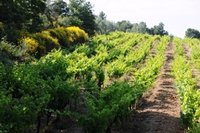organic wine, biodynamic wine, Demeter wine, na... Organic wine lexikon Organic wine-brands of importers
Organic wine-brands of importers

"I bought a super organic wine for 3.50 euros and I can't understand why others are so expensive?"
I hear that again and again in one way or another from people who miss such wines in our range.
I will be happy to explain the reason for this to you and it is up to you whether you still buy these organic wines with a clear conscience afterwards.
- These are organic wines whose origin you cannot trace, which are bought by dealers and importers at incredibly low prices.
- Why are these brands created by importers and wine merchants?
- In this way, the actors prevent a price comparison and can therefore set the sales prices at will.
- The price pressure exerted on producers by trade forces them to produce more and more in order to be able to survive economically. As with livestock farming (cattle, pigs, poultry and other agricultural products), this leads to overproduction at the expense of the environment, inferior product quality and minimal social standards.
- Often the situation of the wineries is exploited, which does not manage to sell their entire production in bottles themselves. Shortly before the upcoming wine harvest, you will be visited by traders in order to buy barrels that are still available at bargain prices. Of course, these are not the best wines from a winery.
- The organic wine brands offered in Germany are predominantly country wines for which there are no restrictions on the amount of harvest per hectare. While they are between 50 and 100 hl / hectare for AOC, DOC and DO wines in Italy, Spain and France, the yields for vin de pays wine can be double or triple. These wines are accordingly weak, lacking in character and faulty. But none of that is a problem, because even for organic wine numerous manipulation options are allowed that producers of true organic wines do not need.
- The range of cheap organic wine, which can be obtained as bulk wine by tank truck from Spain, Italy, France and Germany, is between € 0.20 and € 0.60 per liter, depending on its origin and alcohol content.
- Organic wines that are purchased from wholesalers for example at € 0.20 to € 0.60 / liter are for sale in organic stores, organic markets and on the Internet for around € 4 - 6 per 0.75 l bottle.
The quality of these branded organic wines is not worth the long transport
that pollutes the environment.
This is what the calculation for a bottle of organic branded wine looks like:
For 30,000 liters of wine, the winemaker receives 9,000 €, for which he has to plant around 3 hectares (30,000 m2) of vineyards, work on it for a whole year, harvest the grapes and process them into wine. That is not enough to live on or to pay employees appropriately.
The suppliers of these anonymous wines always emphasize how much more effort and work goes into the production of organic wine, and extol their fair behavior, while their actions threaten the livelihood of the winegrowers, destroy jobs, drive young people from their homeland, and villages die out and desolate entire regions.
This practice is not illegal, you don't have to reveal to consumers who you buy organic wine from by tanker truck. In addition, they are controlled and certified organic. So everything is fine, right? I don't think so, and that's why we only buy wines in original winery bottlings at prices that enable the winery and its employees to enjoy an adequate life.
How do you feel when you pay between € 2,50 up to € 6,50 (including VAT) for a bottle of organic wine, when the winemaker only receives between € 0.20 and € 0,50 per liter?
If you want to save, you can do so by buying our organic wines in bag in box. Like our bottled wines, these are filled in bag-in-box by the winemakers themselves. They are as good as their bottled wines and bag-in-box packaging is even more environmentally friendly.
These are some of the organic branded wines offered in Germany
Country party, Becco, Osteria, Gens et Pierres, Schlükk, Fleur et Fruits, Le Corbeau, Lo Ribaute, Mezzogiorno, Camino, angel champagne, hat off, cook au vin, elf hat, AO tinto, late harvest white HERZOG, La Fête, La Musique, Fiori Naturali, Va Bene, Tramici, La Solea, El Viento, Pfandskerl, Belcante, Le Coq, Madame Juliette, Bouchée, butterfly, Le Pavot, Fleur du Midi, Biovinum, Collina, shell, La Cinderella, Vignale, Casa del Sol, Unum, Tango, Ritus, thomas, Premium, climate protection box, Flor de Montgo, after-work box, crisis box, gas pump, house wine No. 7, house wine No. 8, house wine No. 3, house wine No. 6, house wine No. 1, UKUVA, tomato , Casa los Pinos, TerrAmore, Julian, Canta Rasim von Delinat (there is no such winery, the wine was made by a company called Villabaden-Weinkontor GmbH, in Wolfenweiler, in which the Wolfenweiler wine cooperative and probably also Delinat is involved.
![Biowein [pur] Hartl - organic wine shipper](/WebRoot/Store7/Shops/87b180e2-5584-4f7d-8168-acd5dfe63e0b/Styles/Sharp[3]/logo.png)



